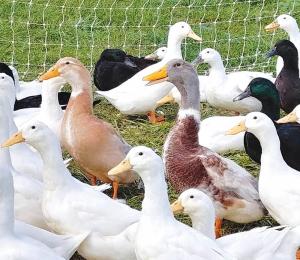2021 - Volume #45, Issue #5, Page #10
[ Sample Stories From This Issue | List of All Stories In This Issue | Print this story
| Read this issue]
Duck Eggs Added To Diversify Small Farm
 |
“Their eggs are delicious, tasting rich and creamy. The amount of bugs they consume is incredible, and any patch of ground you pasture them on will benefit from their nitrogen rich manure,” Bell says.
She had experience raising them in the suburbs with her brother when they were growing up. When she and her husband bought 4 1/2 acres in the country they purchased ducks to keep the tick population down.
“Ducks are a great choice because overall they are prone to much less disease than chickens, turkeys or guineas,” she says.
The most challenging part is during brooding because they are very messy, spilling and playing in water. She refreshes bedding often by sprinkling dry bedding on top. The Bells use portable fencing - poultry netting attached to stakes - that is moved to new pasture each week, and they provide plenty of water to drink and play in. To protect them from predators, the ducks are put in a small building every night. They typically lay eggs in the corners for Bell to gather in the morning.
“They will be highly productive for 2 to 3 years, then their production will drop off a bit every year. However, the older they are the larger their eggs typically are. If you are a small operation, it works well to stagger your flock by ordering ducklings once or twice a year and banding them (with large different-colored leg bands, properly sized for ducks) so you always have a batch beginning to lay, and you also always know which ducks are your oldest ones. If you keep accurate records of which ducks are which age you can sell your oldest as ‘mature laying ducks’ to local farms or families, or even as ‘live stew ducks’ for making broths and soups,” Bell says.
Marketing is another challenge, mainly to educate people about duck eggs.
“Duck eggs boast nearly 9 grams of protein (compared to 6.28 grams in chicken eggs); they are nutrient dense and creamy. They excel when used in baked goods as they moisten and add loft to cakes and breads. Also, many people with autoimmune disorders or chicken egg allergies buy duck eggs from us. However, we were clear that they should check with their medical professional first,” Bell explains.
She has sold wholesale to restaurants, grocery stores and food buying clubs ($3/half dozen) and direct at farmers markets ($6/half dozen). Two duck eggs equal three chicken eggs.
The White Layer Duck breed worked well for the Bells. They are good layers, and somewhat nervous so they were easy to herd. This year, Bell wants to try Indian Runner ducks, which are known for foraging and egg-laying.
“Choose a trusted hatchery. Our favorite hatchery to order from has been Metzer Farms, (Vol. 42; Issue 3) located in California,” she says.
Contact: FARM SHOW Followup, Larry and Katie Bell, Simple Farm, Charlestown, Ind. 47111 (ph 812 748-2126; simplefarmindiana@gmail.com; www.simplefarmindiana.com).

Click here to download page story appeared in.

Click here to read entire issue
To read the rest of this story, download this issue below or click here to register with your account number.




